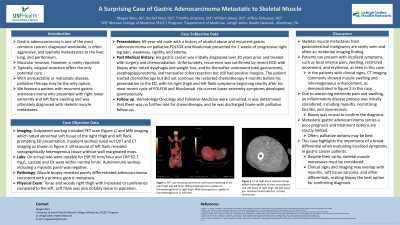Tuesday Poster Session
Category: Stomach
P5070 - A Surprising Case of Gastric Adenocarcinoma Metastatic to Skeletal Muscle
Tuesday, October 29, 2024
10:30 AM - 4:00 PM ET
Location: Exhibit Hall E

Has Audio
- MW
Megan E. Weis, BS
Lehigh Valley Health Network/USF Morsani College of Medicine
Allentown, PA
Presenting Author(s)
Megan E. Weis, BS1, Rachel Patel, DO2, Timothy Graziano, DO2, William Ghaul, DO2, Jeffery A. Debuque, DO2
1Lehigh Valley Health Network/USF Morsani College of Medicine, Allentown, PA; 2Lehigh Valley Health Network, Allentown, PA
Introduction: Gastric adenocarcinoma is one of the most common cancers diagnosed worldwide, is often aggressive, and typically metastasizes to the liver, lung, and peritoneum. Muscular invasion, however, is rarely reported. We feature a patient with recurrent gastric adenocarcinoma who presented with right lower extremity and left flank swelling and was ultimately diagnosed with skeletal muscle metastases.
Case Description/Methods: A 69-year-old male with a history of alcohol abuse and recurrent gastric adenocarcinoma on palliative FOLFOX and nivolumab presented for 2 weeks of progressive right leg pain, weakness, rigidity, and edema. His gastric cancer was initially diagnosed 20 years prior and treated with surgery and chemoradiation. Unfortunately, recurrence was confirmed by recent EGD with biopsy after noted dysphagia and weight loss, and he thereafter underwent total gastrectomy, esophagojejunostomy, and transverse colon resection. His current lower extremity symptoms developed spontaneously. Outpatient workup included PET scan and MRI imaging which noted abnormal soft tissue of the right thigh and left flank, prompting ER presentation.
Labs on arrival were notable for erythrocyte sedimentation rate of 95 mm/hour and c-reactive protein of 52.7 mg/L. Lactate and creatine kinase were within normal limits. Autoimmune workup including a myositis panel was negative. Deep vein thrombosis was ruled out and CT imaging of the right lower extremity revealed diffuse heterogeneity within the musculature and soft tissue. Muscle biopsy revealed poorly differentiated adenocarcinoma consistent with a primary gastric metastasis. Hematology-Oncology and Palliative Medicine were consulted. It was determined that there was no further role for chemotherapy, and he was discharged home with palliative follow-up.
Discussion: Skeletal muscle metastases from gastrointestinal malignancy are rarely seen and often an incidental imaging finding. Patients can present with localized symptoms, as seen in this case. Due to worsening extremity pain and swelling, an inflammatory disease process was initially considered, including myositis, necrotizing fasciitis, and myonecrosis. Biopsy was crucial to confirm the diagnosis. Unfortunately, gastric adenocarcinoma metastatic to any site carries a poor prognosis and treatment options are strictly limited. This case highlights the importance of a broad differential when evaluating localized symptoms in gastric cancer patients. Despite their rarity, skeletal muscle metastases must be considered.
Disclosures:
Megan E. Weis, BS1, Rachel Patel, DO2, Timothy Graziano, DO2, William Ghaul, DO2, Jeffery A. Debuque, DO2. P5070 - A Surprising Case of Gastric Adenocarcinoma Metastatic to Skeletal Muscle, ACG 2024 Annual Scientific Meeting Abstracts. Philadelphia, PA: American College of Gastroenterology.
1Lehigh Valley Health Network/USF Morsani College of Medicine, Allentown, PA; 2Lehigh Valley Health Network, Allentown, PA
Introduction: Gastric adenocarcinoma is one of the most common cancers diagnosed worldwide, is often aggressive, and typically metastasizes to the liver, lung, and peritoneum. Muscular invasion, however, is rarely reported. We feature a patient with recurrent gastric adenocarcinoma who presented with right lower extremity and left flank swelling and was ultimately diagnosed with skeletal muscle metastases.
Case Description/Methods: A 69-year-old male with a history of alcohol abuse and recurrent gastric adenocarcinoma on palliative FOLFOX and nivolumab presented for 2 weeks of progressive right leg pain, weakness, rigidity, and edema. His gastric cancer was initially diagnosed 20 years prior and treated with surgery and chemoradiation. Unfortunately, recurrence was confirmed by recent EGD with biopsy after noted dysphagia and weight loss, and he thereafter underwent total gastrectomy, esophagojejunostomy, and transverse colon resection. His current lower extremity symptoms developed spontaneously. Outpatient workup included PET scan and MRI imaging which noted abnormal soft tissue of the right thigh and left flank, prompting ER presentation.
Labs on arrival were notable for erythrocyte sedimentation rate of 95 mm/hour and c-reactive protein of 52.7 mg/L. Lactate and creatine kinase were within normal limits. Autoimmune workup including a myositis panel was negative. Deep vein thrombosis was ruled out and CT imaging of the right lower extremity revealed diffuse heterogeneity within the musculature and soft tissue. Muscle biopsy revealed poorly differentiated adenocarcinoma consistent with a primary gastric metastasis. Hematology-Oncology and Palliative Medicine were consulted. It was determined that there was no further role for chemotherapy, and he was discharged home with palliative follow-up.
Discussion: Skeletal muscle metastases from gastrointestinal malignancy are rarely seen and often an incidental imaging finding. Patients can present with localized symptoms, as seen in this case. Due to worsening extremity pain and swelling, an inflammatory disease process was initially considered, including myositis, necrotizing fasciitis, and myonecrosis. Biopsy was crucial to confirm the diagnosis. Unfortunately, gastric adenocarcinoma metastatic to any site carries a poor prognosis and treatment options are strictly limited. This case highlights the importance of a broad differential when evaluating localized symptoms in gastric cancer patients. Despite their rarity, skeletal muscle metastases must be considered.
Disclosures:
Megan Weis indicated no relevant financial relationships.
Rachel Patel indicated no relevant financial relationships.
Timothy Graziano indicated no relevant financial relationships.
William Ghaul indicated no relevant financial relationships.
Jeffery Debuque indicated no relevant financial relationships.
Megan E. Weis, BS1, Rachel Patel, DO2, Timothy Graziano, DO2, William Ghaul, DO2, Jeffery A. Debuque, DO2. P5070 - A Surprising Case of Gastric Adenocarcinoma Metastatic to Skeletal Muscle, ACG 2024 Annual Scientific Meeting Abstracts. Philadelphia, PA: American College of Gastroenterology.
